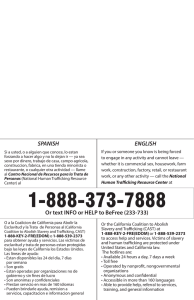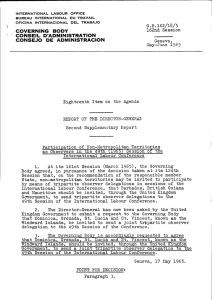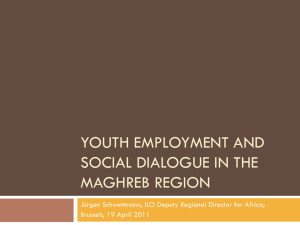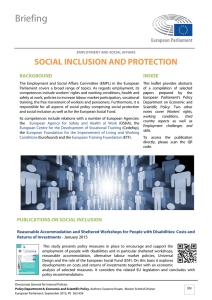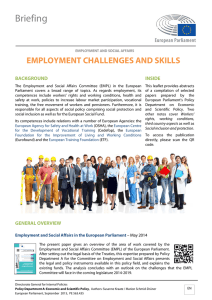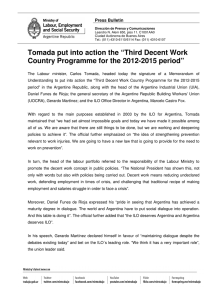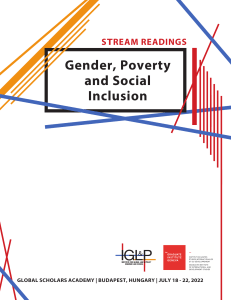Outcome 15 - Forced labour is eliminated
Anuncio
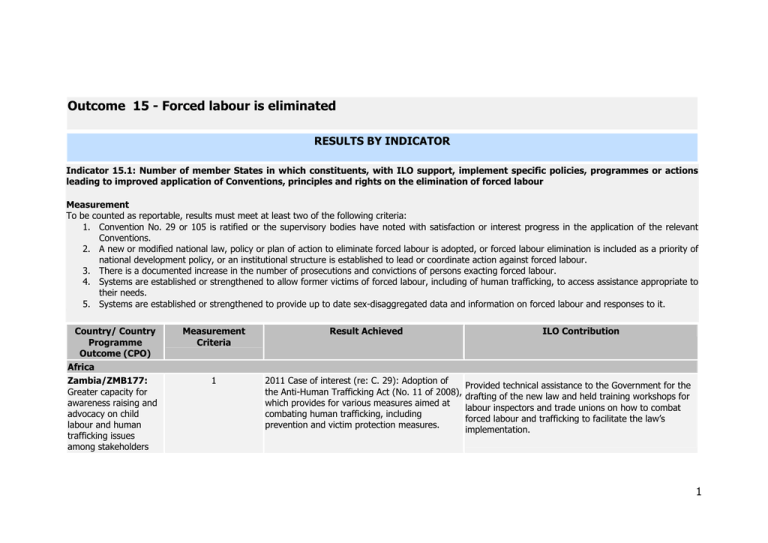
Outcome 15 - Forced labour is eliminated RESULTS BY INDICATOR Indicator 15.1: Number of member States in which constituents, with ILO support, implement specific policies, programmes or actions leading to improved application of Conventions, principles and rights on the elimination of forced labour Measurement To be counted as reportable, results must meet at least two of the following criteria: 1. Convention No. 29 or 105 is ratified or the supervisory bodies have noted with satisfaction or interest progress in the application of the relevant Conventions. 2. A new or modified national law, policy or plan of action to eliminate forced labour is adopted, or forced labour elimination is included as a priority of national development policy, or an institutional structure is established to lead or coordinate action against forced labour. 3. There is a documented increase in the number of prosecutions and convictions of persons exacting forced labour. 4. Systems are established or strengthened to allow former victims of forced labour, including of human trafficking, to access assistance appropriate to their needs. 5. Systems are established or strengthened to provide up to date sex-disaggregated data and information on forced labour and responses to it. Country/ Country Programme Outcome (CPO) Measurement Criteria Result Achieved 1 2011 Case of interest (re: C. 29): Adoption of the Anti-Human Trafficking Act (No. 11 of 2008), which provides for various measures aimed at combating human trafficking, including prevention and victim protection measures. ILO Contribution Africa Zambia/ZMB177: Greater capacity for awareness raising and advocacy on child labour and human trafficking issues among stakeholders Provided technical assistance to the Government for the drafting of the new law and held training workshops for labour inspectors and trade unions on how to combat forced labour and trafficking to facilitate the law’s implementation. 1 2 The National Action Plan (NAP) on Anti-Human Trafficking was revised and the revised version approved by Ministry of Home Affairs in 2011. Provided technical assistance to the NAP revision. The modification includes ILO contribution to the capacity building of district development structures and employers’ organizations on forced labour and trafficking. District coordination structures against forced In Kazungula and Nakonde, held workshops to create labour and trafficking established in two districts awareness and provide clear understanding of human (Kazungula and Nakonde) trafficking and forced labour to the District Development Coordinating Committees (DDCC). The specific objectives of the workshops were to enable participants to: (1) familiarize themselves with the Anti-Human Trafficking Act of 2008 and Zambian labour laws in the context of human trafficking and forced labour; (2) describe the existence of human trafficking/forced labour in the district; (3) explain the causes of human trafficking in the district; (4) identify ways of reporting and documenting occurrences of forced labour and human trafficking incidents in the district; (5) develop action plans for addressing issues of forced labour and human trafficking in the district. Arab States Jordan/JOR154: Enhanced capacity of the Government to prevent and prosecute trafficking and forced labour 2 A National Committee on Anti-Trafficking chaired by the Minister of Justice was formed in early 2010 under the auspices of 2009 anti-trafficking law. The Committee launched the first National Strategy for Combatting Human Trafficking (2010-2012) in March 2010. Strengthened government law enforcement capacity to identify, investigate and prosecute forced labour and human trafficking, including through the adoption of an anti-trafficking law in 2009, the development of the National Strategy against Trafficking in Persons, and the formation of a National Committee for the Prevention of A joint Anti-Trafficking Unit is now in the process Human Trafficking to roll out the Strategy. Also provided of being jointly formed by the Ministry of Labour technical support for the drafting of operational guidelines of the Joint Enforcement Unit. and the Public Security Department. The Unit will deal directly with human trafficking cases, for example by conducting investigations and referring cases for prosecution. 2 5 Garment factories in the Qualified Industrial Zones now have internal assessment tools to collect data, including information on forced labour, through Better Work Jordan's individual factory assessments and customized advisory services. Designed a methodology and provided technical inputs for factory assessments, which were applied in factories participating in the Better Work Programme. The assessments are designed to monitor compliance with international labour standards and national labour law on forced labour as part of this programme. 2 At the policy level, a sub-group on vulnerable groups, including bonded labour, has been created to prepare inputs into the planning process for its 12th Five Year National Plan. Took part in an inter-ministerial task force to review the Bonded Labour System Abolition Act, 1976 (BLSAA). The recommendations were presented to the Union Labour Minister (April 2010). The recommendations focused on definitional clarifications of what constitutes bonded labour, and at the operational level, on the need to focus on a convergence-based model for prevention, in addition to identification and rehabilitation, to address the root causes of bondage. These inputs were sent to the Planning Commission by the Ministry of Labour and Employment (MoLE). Asia- Pacific India/IND152: Strengthened policy framework for reducing vulnerability to bondage At the operational level, a Memorandum of Understanding has been established in June 2011 between two states - Orissa and Andhra Pradesh - to develop mechanisms to improve inter-state coordination to address bonded labour among migrant brick-kiln workers. Based on a pilot experience in Tamil Nadu, four other states - Tamil Nadu, Andhra Pradesh, Orissa and Uttar Pradesh - have developed a plan of action for elimination of bonded labour. 4 Brick-kiln workers (susceptible to situations of bondage) have access to welfare benefits by inclusion under the Building and Other Construction Workers Act. They are also being provided access to health services through the Rashtriya Swasthya Bima Yojana (RSBY) model of health insurance. Helped workers to procure the documents they require to have year-round access to various welfare schemes, including the public distribution system of subsidized essential commodities, through interventions in both the source areas and the districts where the brick kilns are located. This helped overcome one of the obstacles that prevent brick-kiln workers from gaining access to welfare entitlements – namely, the fact that they move out of their place of origin for a part of the year. 3 Nepal/NPL828: Government place an integrated approach to the elimination of bonded labour at the heart of their relevant development, social and/or anti-poverty 2 An improved model of the recruitment system for brick-kiln workers focusing on transparency through written contracts has been developed through consensus with employers and workers. Since 2001 the ILO has been working in India to prevent bonded labour through technical cooperation. Following ILO-commissioned research, and subsequent deliberations of the tripartite sub-committee on recruitment, the Department of Labour and Employment of the Tamil Nadu State Government advised the employers and unions to develop and test an ‘appointment order-based recruitment system’. Subsequently, the concept of a workers pool/recruitment cell was developed through a social dialogue process. This is now being field tested by a coalition of trade unions in agreement with the employers’ associations. The ILO provided technical assistance throughout the process. This included the holding of two workshops for labour recruiters in July 2011 in Kanchipuram district to orient them on the improved recruitment system, the advantages of establishing documents showing proof of employment and their role in field testing the process. An employer’s code of conduct to improve work place facilities is operational in Tamil Nadu and is being replicated in Uttar Pradesh and Andhra Pradesh. Organized a workshop on the link between worker welfare and productivity, in which some 40 owners and managers of brick kilns participated. As a follow-up to it, a Code of Conduct was adopted (February 2010) under which the signatory employers commit to undertaking a range of workplace improvements and to respect workers’ rights. In February 2011, the revised Foreign Employment Regulation was endorsed by the Government. Provided technical comments on the revision of Foreign Employment Regulation. Technically assisted the Government in tailoring ILO standard training manual on monitoring of recruitment agencies into Nepali context; manual was published in Nepali in May 2011. 4 policies and programmes 4 In February 2010, a new Foreign Employment Tribunal (FET) was established and started prosecuting and convicting persons involved in frauds, especially of women and girls. Provided technical support for the drafting of the Foreign Employment Tribunal Regulation, as well as the establishment of the Tribunal. Provided capacity building for the newly appointed judges of the Tribunal through workshops in Nepal and at the Turin Centre. 5 In July 2011, an e-foreign employment information and database management system was established by the Government. The Government also validated a survey on bonded labour. Organized a study tour on the foreign employment management information system to Sri Lanka for government officials concerned and provided technical support for the setting up of the system. Executed the survey and supported its validation. 2 Algunos Estados están implementando políticas siguiendo modelos exitosos desarrollados en otros Estados y creando Comisiones Estaduales (COETRAES); ese es el caso de Rio de Janeiro, que ha instalado su COETRAE en Junio de 2010, la séptima del país (las otras 6 son las de Mato Grosso, Bahia, Pará, Maranhão, Piauí y Tocantins). Se registran cambios importantes en la legislación relativos al tema de la trata de personas. En 2010, fue presentado al Congreso Nacional el texto del Convenio Internacional sobre Protección de los Derechos de Todos los Trabajadores Migrantes y de los Miembros de sus Familias, adoptada por la Asamblea General de las NNUU en diciembre de 1990. El II Plan Nacional de Enfrentamiento a la Trata de Personas ya está siendo elaborado a través de consulta pública. La OIT participa activamente de la CONATRAE, incluso en su comisión ejecutiva. Con relación a las COETRAEs, la OIT es uno de los miembros del grupo gestor y brinda asistencia técnica a ellas, en algunos casos conduciendo misiones in loco. Ha realizado un levantamiento de las políticas públicas y de la legislación brasileña, considerando el contenido del Protocolo de Palermo y las adecuaciones necesarias al fortalecimiento de las acciones de enfrentamiento a la trata de personas. Este material será un importante apoyo a las discusiones del II Plan Nacional de Enfrentamiento a la Trata de Personas. Además, la OIT ha apoyado directamente, en articulación con IPEC, el proceso de discusión del Plan Estadual de Enfrentamiento a la Trata de Personas en Mato Grosso, por medio da realización de eventos, producción de materiales de discusión y participación en seminarios y talleres. 4 Mato Grosso está implementando desde 2010 Ese programa cuenta con la asesoría técnica de la OIT Americas Brazil/BRA127: The formulation and implementation of public policies and social actions related to eliminate forced labour and trafficking in persons are supported and improved 5 acciones de rehabilitación y reinserción de desde su inicio. La experiencia del programa está siendo victimas como parte de una política pública sistematizada por el Gobierno del Estado, con la asesoría adoptada por el Estado. Recientemente, 25 técnica de la OIT. El objetivo final será la replicación del víctimas de trabajo forzoso fueron reinsertadas programa en otros Estados. La OIT ha apoyado la SNJ en en el mercado formal laboral en las obras de la producción de materiales de capacitación sobre el uno de los estadios que van a recibir el Mundial tema de la trata de personas con vistas a la mejoría del de Fútbol en 2014. El atendimiento a las atendimiento. La OIT ha apoyado el proceso de consulta víctimas de trata de personas fue incorporado en pública a la sociedad civil y ha realizado eventos de el sistema de asistencia social. Los Centros de fortalecimiento de organizaciones de la sociedad civil Referencia de Asistencia Social (CRAS), que para la elaboración de propuestas para la mejoría de la hacen parte de la estructura del Ministerio del acción gubernamental en el atendimiento a las víctimas Desarrollo Social y Combate a la Hambre (MDS), de trata de personas. iniciaran el atendimiento a las víctimas de trata de personas. Además, la Secretaria Nacional de Justicia (SNJ), del Ministerio de Justicia (MJ), está ampliando la implantación de Núcleos y Puestos de Atendimiento a las víctimas. Actualmente están en funcionamiento núcleos y puestos en los siguientes estados: Goiás, Pará, Pernambuco, Rio de Janeiro, São Paulo, Acre y Pará. Europe-Central Asia Armenia/ARM127: Strengthening constituents capacity to develop and implement policies to combat forced labour and human trafficking 3 According to the Prosecutor General's office there is an increased number of both prosecutions and convictions of trafficking in human beings in the country (in 2010, nine criminal cases, three convictions, four persons convicted; in 2011, ten criminal cases, five convictions, eight persons convicted). This has followed the strengthening of Law Enforcement agencies’ capacity to detect, investigate and prosecute criminal activities in the trafficking of human beings. Provided technical assistance for the development of the training manual on combating trafficking in humans for law enforcement agencies. Conducted pilot training of trainers for law enforcement agencies (February 2011) and three trainings (one in Yerevan and two in provinces) for law enforcement practitioners and labour inspectorates (second half of 2011). 6 4 5 Criminal Code was amended in 2011. The amendments include a new formulation of human trafficking and exploitation. A number of other articles have been also revised. According to the Criminal Code, separate acts that were not criminally punishable have been criminalized. Conducted 15 seminars on amendment of the Criminal Code for law enforcement agencies and other interested authorities that cooperate with the law enforcement organs (i.e. Prosecutor’s Office, Judiciary, and Executive Committees). National Referral Mechanism (NRM) for victim assistance was periodically updated through the specifically created Inter-Agency Working Group (IAWG) (March 2011). Invited State Labour Inspectors to attend a National Forum on NRM, where ILO chaired a session on combating forced labour and the trafficking of human beings and provided trainings for the coordination and cooperation of national anti-trafficking teams. Focal points in the Confederation of Trade Unions of Armenia provided 126 people with legal advice on safe migration and 48 people received face-to-face consultation. Through the Office of the Organisation of Security and Co-operation in Europe (the ILO project partner in Yerevan), organized a study visit to Poland for the Ministry of Labour and Social Insurance and national NGO representatives; the visit covered relevant experience in NRM, shelter operations, victim protection and assistance through state-NGO cooperation, to enable participants to learn from their experience and organize a better victim-oriented assistance and protection system in Armenia. Also supported trade union members by providing competent and important information on safe migration opportunities and about the identification methods of potential human trafficking and forced labour, Data collection mechanism strengthened through the specifically created Inter-Agency Working Group (IAWG). Delphi methodology is introduced. Supported installation of test version of database on Trafficking in Human Beings, which was installed in the offices of repositories by the International Centre for Migration Policy Development, and its translation into Armenian. Developed the end user manual and provided training on database usage (2011). National Statistical Service conducted the Provided assistance to the National Statistics Service, a 7 Azerbaijan /AZE902: Strengthening constituents’ capacity to develop and implement policies to combat forced labour and human trafficking Georgia/GEO901: Strengthening 2 victim-centred quantitative survey with full participation of IAWG members. After the presentation of the survey IAWG members debated the results and compiled recommendations for its finalization victim-centred quantitative survey and co-hosted workshop for the Inter-Agency Working Group members to validate the survey data. Coordination of the implementation of the National Action Plan to combat trafficking has been improved through workshops (involving all stakeholders), aimed at providing technical support and advice in the preparation, implementation and follow-up of the National Action Plans. Conducted two national workshops on implementation, monitoring and evaluation of the NAP with stakeholders, such as Ministries of Labour and employers’ and workers’ organizations. Participated with project partners in several meetings with Government agencies to provide technical assistance and consultations on implementation of specific actions of the NAP. Code of Conduct for Republic Union of Employers of Armenia and Azerbaijan Employers’ Confederation (AEC) was developed, adopted and signed. Provided technical assistance to prepare the Code of Conduct and to organize the signing ceremony. With the AEC, organized grassroots workshops in Baku and the regions on monitoring of compliance with the Code of Conduct for member organizations. 4 Victims’ assistance centre established under the Conducted international research aimed at a Minister of Labour to facilitate social integration comprehensive report on the impact of the assistance of victims. provided to victims of trafficking. Provided technical assistance to the centre on a case-by-case basis. 114 former victims of trafficking or labour Supported the Azerbaijan Trade Union Confederation’s exploitation have been provided with various focal point to provide assistance to 130 trade union forms of assistance, as listed in the IOM report members and more than 120 potential migrants. on the impact of the assistance. Provided technical assistance to the government in Standard Operating Procedures. 5 Data collection mechanism established and strengthened within the Ministry of Interior, as the National Coordinator on anti-trafficking 2 A new National Action Plan 2011-2012 on Held four national workshops on the NAP with Forced Labour was adopted by the Government stakeholders on implementation, monitoring, evaluation Supported installation of test version of database on the trafficking on human beings in Azeri in the offices of repositories. Developed end user manual and provided training on database usage. 8 constituents’ capacity to develop and implement policies to combat forced labour and human trafficking of Georgia in March 2011. of the NAP and drafting of the new NAP. Guiding principles on the trafficking of human beings and forced labour for employers were signed by the Georgian Employers’ Association (GEA). Provided technical assistance for developing the Guiding principles for Employers and business against trafficking in human beings-forced labour and organizing a special signing ceremony. With GEA, organized the “Regional Workshop for Employers’ Organizations from the South Caucasus and Destination Countries on Strategies against Human Trafficking and Forced Labour”, and four grassroots workshops on the role of business in addressing forced labour for trafficking in Georgia. 4 The Standard Operating Procedures of the Facilitated the strengthening of the Georgian National Referral Mechanism are developed and Government’s victims’ assistance programme, for available in English. example, by providing technical assistance for the development of the Standard Operating Procedures. Continued to support the strengthening of the National Referral Mechanism by participating in the ad hoc meetings of the Victim Identification Permanent. 5 Data collection mechanism developed and strengthened by installing a database in the State Fund for the Protection and Assistance to Victims of Trafficking in Persons of Georgia and in the Prosecutors Office/Ministry of Justice, in collaboration with the Ministry of Interior and Special Operations Department in 2010. Supported installation of test version of victim-centred database and trafficker-centred database on the trafficking of human beings in Georgian in the offices of repositories. Developed end user manual and provided training on database usage. 9 EXAMPLES OF GLOBAL OUTPUTS Hard to see, harder to count: Survey guidelines to estimate forced labour of adults and children A methodological guide on how to measure forced labour – Hard to see, harder to count – was launched in Washington and published in 2011. The guidelines aim to provide comprehensive information and tools to enable national statistical offices and research institutions to undertake national surveys on forced labour and trafficking of adults and/or children. The guide accompanies the validation of ten pilot surveys on forced labour completed at the national level. A report on the Washington launch and more detailed information on the guidelines are available at www.ilo.org/forcedlabour. Partnerships with the International Trade Union Confederation (ITUC) and the International Organization of Employers (OIE) to combat forced labour Within a partnership with the ILO, through its Special Action Programme to combat Forced Labour (SAP-FL), ITUC has set up an updated web site featuring a new campaign against forced labour and a blog sharing best practices to combat forced labour. SAP-FL has also been working with employers' organizations to provide training on combating forced labour to employers and businesses, for example in China, Oman and Viet Nam. This work is based on an ILO's handbook for employers, which has been developed in close consultation with IOE. Webinar on “Eradicating Forced Labour from Global Supply Chains” The first webinar on “Eradicating Forced Labour from Global Supply Chains”, organized by the ILO Helpdesk for Business and Special Action Programme to combat Forced Labour, was held on 26 October 2011. It provided practical guidance on assessing and addressing forced labour risks to the tripartite constituents and others, including specialists in the area of Corporate Social Responsibility, managers, researchers and investors. The seminar also highlighted specific ILO projects with business in order to highlight good practices and demonstrate how business can work with trade unions, civil society groups and public policy actors to identify and eliminate forced labour and trafficking. Information on the webinar is currently available at: www.ilo.org/forcedlabour. 10

